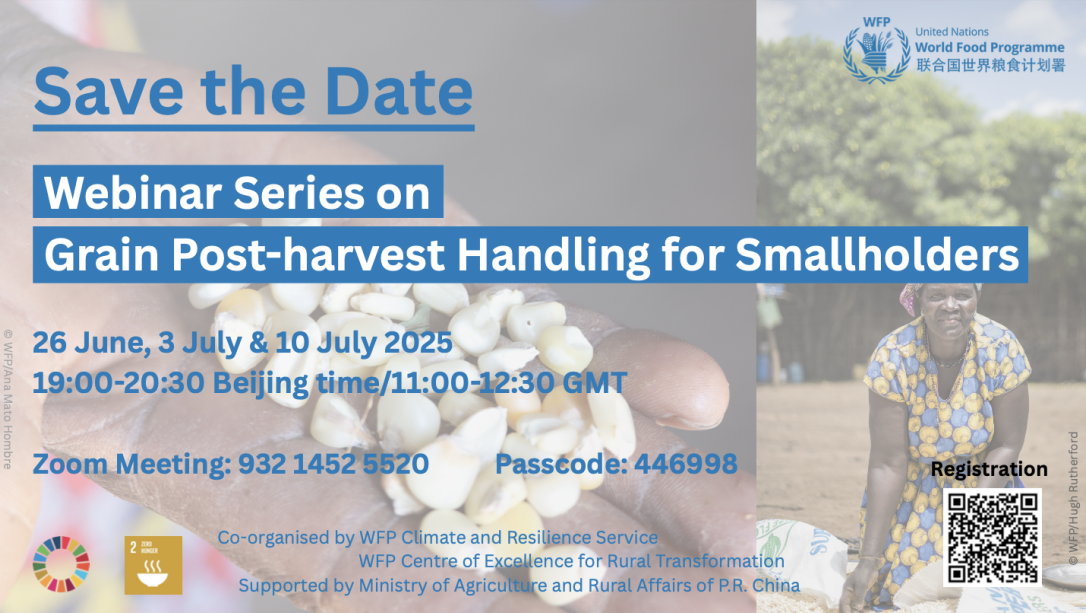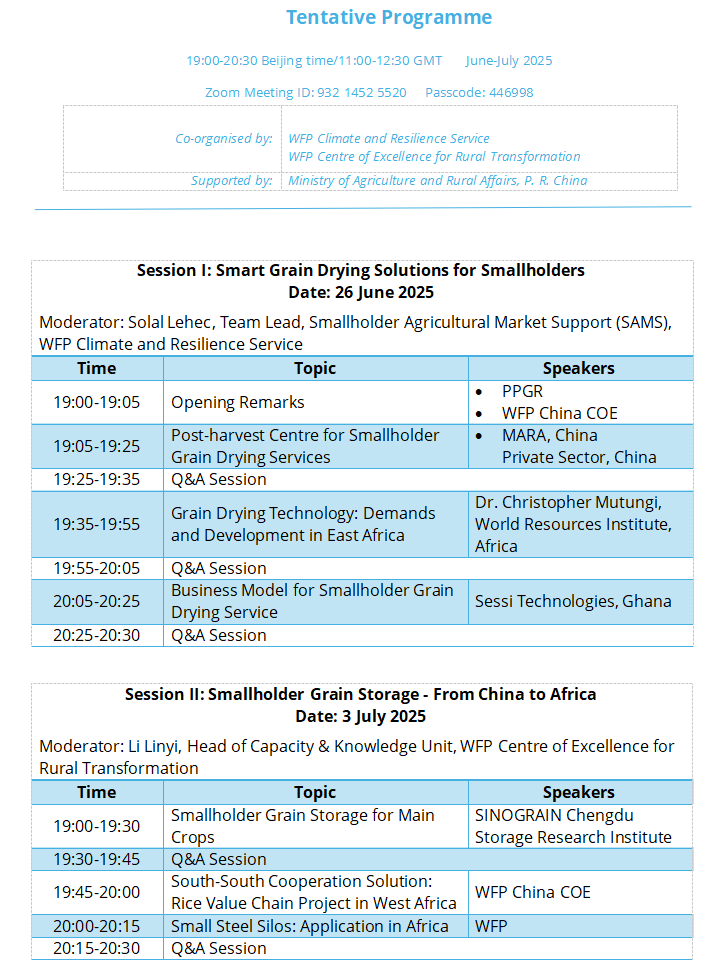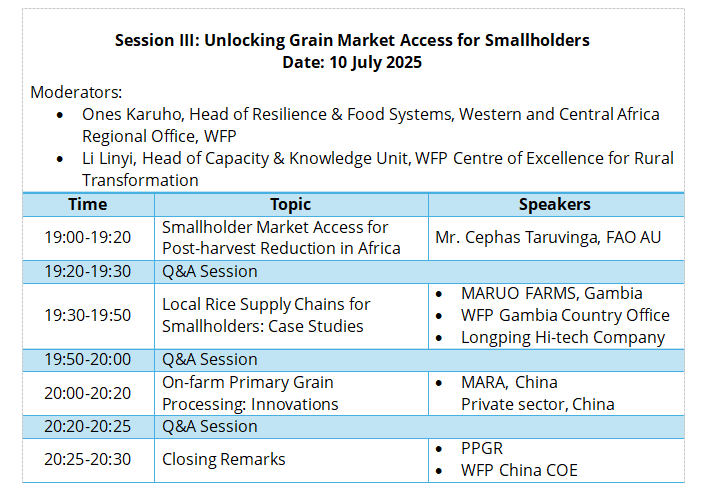
Background
Food insecurity remains a critical global challenge, with an estimated 343 million people experiencing acute food insecurity. Post-harvest loss is a key contributor to this problem, exacerbating difficulties in ensuring stable food supplies worldwide. A significant portion of these losses stems from the vulnerabilities of smallholder farmers, who play a crucial role in agricultural production, particularly in developing regions. However, they suffer disproportionate post-harvest losses due to inadequate handling practices, primarily from improper drying methods, substandard storage facilities, and limited market access.
The World Food Programme (WFP) has long prioritized empowering smallholder farmers to reduce post-harvest losses through scalable solutions. These efforts include facilitating access to improved post-harvest technologies, capacity-building in proper handling and storage practices, and enhancing the market competitiveness of smallholder farmers and other value chain actors to improve market linkages and strengthen global food system resilience. In grain value chains, for example, WFP’s Post-Harvest Loss Management Programme supports smallholder farmers in developing countries by providing low-cost, locally produced threshing, drying and hermetic storage solutions such as bags and silos, alongside complementary hands-on training on their effective use.
The WFP Climate and Resilience Service (PPGR), through the Smallholder Agricultural Market Support (SAMS) workstream, serves as the custodian of WFP’s programmatic approach to post-harvest management (PHM). PPGR leads the design of PHM interventions, the development of normative guidance and solution manuals, and provides technical support to regional and country offices. In alignment with WFP’s food systems and resilience-building agenda, PPGR works collaboratively across WFP services/units and with external partners to ensure coherence, convergence, and scalability of PHM solutions. These interventions are designed not only to reduce post-harvest losses but also to enhance smallholder productivity, food safety and quality, competitiveness, and market access—thereby strengthening livelihoods, food security, and the resilience of vulnerable communities across diverse operational contexts.
The WFP Centre of Excellence for Rural Transformation (WFP China COE) has prioritized post-harvest loss management as a key thematic area to help developing countries enhance food security and strengthen food system resilience. Working with technical partners, WFP China COE identifies Chinese solutions adaptable to other developing country contexts and shares these innovations with potential beneficiaries through various South-South and Triangular Cooperation initiatives. Since 2016, WFP China COE has implemented capacity-building programs that have benefited hundreds of stakeholders across multiple developing countries. In 2024, a total of 10 webinar sessions have been conducted to share China's expertise in grain post-harvest management, with particular focus on large-scale grain storage solutions.
Rationale
Feedback from previous capacity-building initiatives revealed strong demand among partner countries for knowledge sharing on smallholder-focused grain post-harvest handling solutions. Many developing countries continue to experience substantial post-harvest losses throughout the drying, storage, and processing-to-market stages. These challenges are further compounded by underdeveloped agricultural infrastructure and limited access to essential agricultural services.
China has achieved remarkable success in reducing post-harvest losses among smallholder farmers through a comprehensive, multi-sectoral approach integrating policy interventions, technological innovation, and infrastructure modernization. The Ministry of Agriculture and Rural Affairs (MARA) has systematically promoted integrated post-harvest technologies, renewable energy applications, and established grain post-harvest service centres nationwide through agricultural cooperatives. The National Food and Strategic Reserves Administration (NAFRA) implemented the landmark "Quality Food Project," distributing over 10 million standardized grain storage containers nationwide. This initiative reduced average post-harvest losses among smallholders from 8% to under 2% - representing one of the most successful loss-reduction programs globally. The increasing engagement of private sectors also makes valuable contribution to smallholder post-harvest management. These coordinated efforts have not only significantly reduced post-production losses but also increased smallholder incomes by 15-20% in pilot regions. China's proven model now offers scalable, adaptable solutions for global post-harvest loss reduction while creating a robust platform for future innovations in smallholder grain post-harvest handling.
Across other developing countries, innovative market-based solutions are being deployed to tackle smallholders' post-harvest losses. From mobile platforms delivering post-harvest services to pay-per-use cold storage units, private sectors are scaling technologies and products for smallholder post-harvest handling operations. Non-government organisations (NGOs) are actively engaging in improvement process of smallholder market access by elaborating technical support and capacity building on post-harvest management. The conceptual agricultural value chain development is also attracting impact investors with embedded financial services to support post-harvest solutions.
The WFP China COE collaborates with specialized technical partners both within China and internationally to share efficient and effective solutions for smallholder grain post-harvest loss reduction through South-South and Triangular Cooperation. Key partners include the Academy of Agricultural Planning and Engineering (AAPE) under MARA owning smallholder-based solutions including grain collection and storage technologies, and integrated drying-storage systems, the SINOGRAIN Chengdu Storage Research Institute specializing in the grain storage equipment for smallholders, who has developed the Mini Steel Silo - an efficient storage solution successfully implemented in several African countries. WFP in more developing countries also work with various local and international partners to provide support through policy guidance, program design, and technical assistance for smallholder post-harvest loss reduction.
Objective
The webinar series aims to share and exchange adaptable technologies, equipment, and business models to strengthen smallholders’ capacity in reducing grain post-harvest losses. Specifically,
1) Share adaptable, affordable, and applicable technologies, equipment, and business models for smallholder grain post-harvest handling.
2) Provide a platform for knowledge exchange among developing countries and specialized sectors to explore diverse technical solutions and facilitate further cooperation.
Targeted Participants
The webinar series is public online capacity-building initiative primarily targeting community representatives and supporters of smallholders' grain post-harvest loss reduction.
WFP colleagues working on relevant topics or with an interest in these subjects are also welcome to participate in the webinars.
Programme
Three webinar sessions will be conducted from 19:00-20:30 Beijing Time (11:00-12:30 GMT) on Thursdays from the end of June to early July 2025. Each session will feature thematic sharing by guest speakers followed by interactive discussions between presenters and participants. Please see Annex for more agenda details.
Relevant thematic video courses from the WFP-China South-South Cooperation Knowledge Sharing Platform and Cloud School (www.wfpchinacoe.net) will be shared with registered participants as reference in advance. A post-survey will be administered to collect participant feedback and identify priority areas for future capacity building initiatives.
All sessions will offer simultaneous interpretation services in Chinese, English, French, and Spanish to ensure inclusive participation.
Certification
A Certificate of Completion will be awarded to participants who attend all sessions in full (no early exits). Participants must register with their official full name and a valid, deliverable email address for certificate issuance. WFP China COE reserves the final right to interpret all matters pertaining to certificate issuance.
Organisation
WFP PPGR and WFP China COE will co-organise the webinar with support from the Ministry of Agriculture and Rural Affairs, P. R. China.
Invitations will be distributed to concerned developing countries, with support from WFP Regional Offices, Country Offices, COEs, and PHL team, with priority given to those engaged in PHL-related activities and projects. WFP staff and partners working on relevant topics, along with other interested colleagues, are also welcome to participate.


Additional Notes:
· All agenda times are in Beijing Time (GMT+8).
· Participants are advised to join 5–10 minutes early for smooth access.
· For inquiries, contact the organising team at sha.sha@wfp.org and kukom.edohognakossan@wfp.org.

